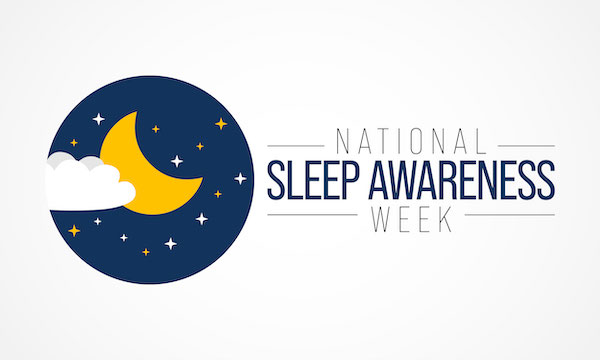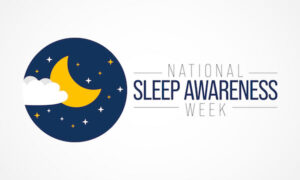Sleep Awareness As We Prepare To Spring Forward

It’s not your imagination if you feel more tired after you “spring forward” in March. Daylight savings time begins on March 13 this year at 2 AM, meaning once you go to bed for the night, you lose an hour of sleep. Coincidently, Sleep Awareness Week also occurs the week of March 13th through the 19th. Although there are benefits such as longer daylight and the anticipation that spring and summer are on their way, it can take a toll on your mind and body. As daylight savings time (DST) approaches, it’s important to understand the effect it can have on a person.

Sleep is an extremely important aspect of living a long and healthy life. Launched in 1998 by the National Sleep Foundation (NSF), Sleep Awareness Week is an educational campaign focused on encouraging the public to prioritize sleep in order to promote health and well-being. Over 35% of adults in the United States report sleeping less than seven hours a day. This can lead to mental fog, lack of awareness, mood changes and an overall feeling of lethargy as well as being less productive. In order to gain the most out of each day, and live life to the fullest, it’s important to get quality sleep every night and DST doesn’t help any!
According to the American Academy of Sleep Medicine (AASM), 55% of U.S. adults said they feel tired after the spring daylight savings time change. Another study by cell.com also notes that “28 fatal accidents could be prevented yearly if the DST transition was abolished” based on the fact that the spring daylight savings time transition “acutely increases fatal traffic accident risk by 6% in the U.S.”. That being said, there are steps you can take to help minimize the impact of the loss of sleep. The combination between sleep awareness week and DST is the perfect opportunity to understand the fundamental importance of a good nights rest. According to health.gov, the following are benefits of getting enough sleep:
- Lower rates of sickness than the sleep deprived
- Greater ability to maintain healthy weight
- A reduced risk for serious health concerns such as diabetes and heart disease
- Less stress and improved mood
- Increased function while at work or in school
- More contentment and good will towards others
- Less “cloudiness” leading to better decision making
Not only does quality sleep help you to feel better but it also increases a persons’ overall mental perception and awareness, many times leading to a better quality of life and satisfaction. In terms of things to consider when contemplating your own sleeping behaviors and patterns, remember, that many adults in today’s society have issues sleeping because of stress, medication, caffeine or other untreated disorders. If you have sleeping issues, it’s best to address your concerns by talking to a professional.
Beyond sleeping issues and the effects it has on the body, being mindful is important. Think about the following:
- As we age, the amount of sleep we need to feel fully rested and recharged goes down. Meaning that as a teenager you may need up to 10 hours of sleep a night while as an adult, on average, 7 – 8 hours should do the trick.
- Plan your day accordingly by reducing physical activity, food, caffeine and other stimulative activity before bedtime.
- Creating a pattern keeps the body in sync throughout the day so try and maintain a similar bedtime each night.
- The bedroom should be comfortable meaning dark, quiet and the right temperature. Cooler temperatures are advised.
- When waking up, fresh air and exposure to sunlight in the morning help to establish and maintain normal daily behavior. Think about getting some fresh air and vitamin D after waking up (if the weather allows).
As we’ve mentioned, DST plays a role in our sleep habits and although it only happens twice a year, it’s important to prepare for it. Here are a few tips:
- Before Daylight Savings Time on March 13th, gradually adjust your sleeping pattern. That means going to bed and waking up about 15 – 20 earlier than you normally would every day the week prior in order allow your body and mind to adapt. Gradually increase as you get closer to the 13th so that by Monday morning, you’ll be well adjusted.
- Once your body is adjusted to your new sleeping pattern, be sure to set your clock (if you still use one and don’t rely on your smart devices) an hour ahead so that you don’t miss that important meeting the next day.
Sleep is just one component of living a long, healthy life. There are numerous other factors that play a role in a humans lifespan including family genes. Though there are things that we cannot control, those we can control should be taken seriously, especially if aging in place is important to you. Attempting to get enough rest is something to focus on so be conscious of your sleep patterns and habits as you prepare to spring forward. For more information on sleep awareness week visit NSA.
- Bridging the Gap: Supporting Seniors Without Nearby Family
- Distance Caregiving Simplified: Modern Strategies for Compassionate Support
- Why LifeFone is the Best Choice for Your Loved Ones Safety and Security
- Beyond Medical Emergencies: The Versatility of Medical Alert Devices in Fall Detection and Beyond
- How to Get Up Safely After Taking A Fall
FREE BROCHURE Today!
